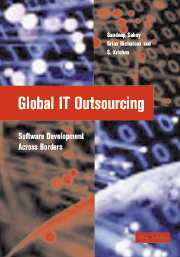Book contents
- Frontmatter
- Contents
- List of figures
- List of tables
- List of boxes
- Foreword
- Acknowledgements
- List of abbreviations
- 1 Introducing the phenomenon of global software work
- 2 Globalization and global software work
- 3 GlobTel's GSA programme in India
- 4 The GlobTel–Witech relationship: a ‘standardization’ perspective
- 5 Global software work: an identity perspective
- 6 The GlobTel–MCI relationship: the dialectics of space and place
- 7 Managing the knowledge transfer process: the case of Sierra and its Indian subsidiary
- 8 The case of Gowing and Eron GSA: power and control
- 9 Cross-cultural communication challenges: GSAs between Japanese and Indian firms
- 10 Reflections and synthesis on theoretical insights
- 11 Managerial implications
- Index
- References
10 - Reflections and synthesis on theoretical insights
Published online by Cambridge University Press: 14 January 2010
- Frontmatter
- Contents
- List of figures
- List of tables
- List of boxes
- Foreword
- Acknowledgements
- List of abbreviations
- 1 Introducing the phenomenon of global software work
- 2 Globalization and global software work
- 3 GlobTel's GSA programme in India
- 4 The GlobTel–Witech relationship: a ‘standardization’ perspective
- 5 Global software work: an identity perspective
- 6 The GlobTel–MCI relationship: the dialectics of space and place
- 7 Managing the knowledge transfer process: the case of Sierra and its Indian subsidiary
- 8 The case of Gowing and Eron GSA: power and control
- 9 Cross-cultural communication challenges: GSAs between Japanese and Indian firms
- 10 Reflections and synthesis on theoretical insights
- 11 Managerial implications
- Index
- References
Summary
Introduction
The set of case studies discussed in this book emphasizes the significant complexity inherent in GSAs, and the need for theoretical approaches that allow us to go ‘behind’ the surface of the phenomenon and build insights that help answer questions about ‘Why does the GSA process unfold a particular way?’ In the cases discussed, the complexity of GSAs has been described as a multiplicity of inter-connected influences including aspects of industry, national economy, organizational strategies and the desires, expectations and mobility of individual developers operating in a global marketplace. The increased interest in GSAs has introduced new actors into ongoing debates on immigration and foreign policy. While firms may argue for GSAs based on economic and resource considerations, worker associations and unions criticize the potential danger of local job losses and argue instead for the retraining of unemployed adult populations. Government policy makers, especially in developing countries, face the complex task of balancing the need for fostering growth, which inevitably requires the active engagement of private sector investments that GSA firms provide, with the protection of rights of marginalized groups.
Beck (2000) uses the metaphor of ‘Brazilianization’ to describe the global employment market in the West which he considers to be increasingly characterized by unemployment and underemployment. Writing from primarily a European perspective, Beck paints a rather bleak picture of the world of work, and tends to downplay how global relocation of work from countries such as Germany can lead to opportunities in other parts of the world, such as India.
- Type
- Chapter
- Information
- Global IT OutsourcingSoftware Development across Borders, pp. 203 - 235Publisher: Cambridge University PressPrint publication year: 2003



